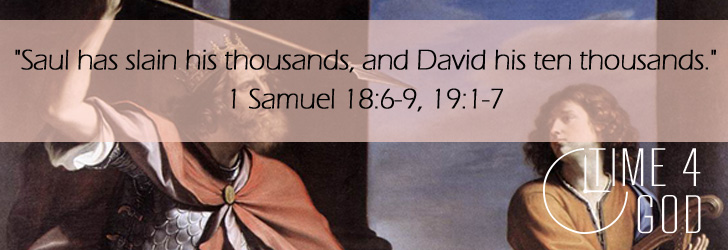A Rock and a Hard Place
In this powerful passage from the first book of Samuel, we see a moral dilemma unfolding before our very eyes. This scene follows David’s unbelievable victory over the Philistine giant, Goliath.

In this powerful passage from the first book of Samuel, we see a moral dilemma unfolding before our very eyes. This scene follows David’s unbelievable victory over the Philistine giant, Goliath. Israel has been saved by a youth, with a sling and a rock. On the way home from the field of battle, the news of the victory preceded the returning troops and they were met in every town with women singing the praises of the army and its victory. The people’s joy is honest and fervant. They have heard of David’s feet against Goliath and their song expresses their thanks and joy. They do not intend to insult Saul, the king, but because Saul sees the world through the prism of his own ego, he takes these songs of praise as a slight toward him. He feels threatened by David’s success, that the people might be seeing David as kingly material.
[content-ad]
Saul, in his jealousy, speaks to his son, Jonathan, in the presence of his servants, of his intention to kill David. It is Jonathan that we must keep our eyes on here. It is Jonathan that has something to teach us. He is put in between the perverbial ʺrock and a hard placeʺ here. He is Saul’s son, but he is also David’s friend. To whom are his loyalties to be given? Jonathan has to make an impossible choice between his father and his friend. How many times have we found ourselves caught in a similar situation? We love both parties involved, but we also recognize that one is being motivated by lesser values. We don’t want either to be hurt, but a decision has to be made. To do nothing would have consequences that could be destructive to all concerned.
Jealousy is a terrible thing. The unrecognized and unchecked ʺgreen monsterʺ knows no limits. It will do whatever it perceives is necessary to remain on top. In this case, it is murder that is being contemplated. Jonathan is the one who must act wisely here. He warns David of Saul’s intentions. He then counsels his father, Saul, ʺLet not your majesty sin against his servant David, for he has committed no offense against you, but has helped you very much by his deeds. When he took his life in his hands and slew the Philistine, and the Lord brought about a great victory for all Israel through him, you were glad to see it. Why, then, should you become guilty of shedding innocent blood by killing David without cause.ʺ Saul, understood the wisdom that his son, Jonathan, had spoken and turned away from his original intentions.
Jonathan knew that there are no easy answers for difficult issues. He knew that in such situations God’s wisdom is what is needed. Jonathan shows us how to make good use of God’s wisdom here. He had been given an either/or choice between his father, or his friend. But Jonathan would not be drawn in, because he wanted both Saul as his father, and David as his friend. He did not want to have to choose between them. He did not want to lose either of them. Jonathan chose a path that had its risks, but also its great rewards. He protected David by telling him of Saul’s intentions, but he also counseled his father with wisdom so simply and clearly put that Saul could not deny it. Jonathan’s trust in God won the day for both.
It is our duty, as children of God, to study God’s wisdom and to apply it to our lives. We are not alone in this effort. The Holy Spirit is our guide. The scriptures are our tutor. The teachings of the Church are clear. And Jesus is our perfect model. We must listen to the wisdom-counsel of our God, because we are going to be put in seemingly untenable positions at some time in our adult lives. We do not have to go into them unarmed. Thank God!
SKM: below-content placeholderWhizzco for FHB

